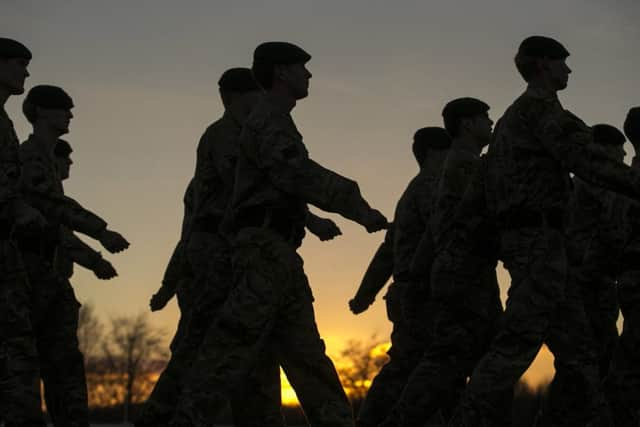Charity demands MPs take action on recording ex-military suicides
An investigation last year by The Scotsman and its sister titles within the JPI Media group revealed figures for former service personnel taking their own lives which are available to the Scottish and Westminster governments are withheld from scrutiny by the general public.
The absence of official records of suicides among Britain’s 2.6 million military veterans led to ministers being accused of turning “a blind eye” to concerns. The US, Australia and Canada record the number of veteran suicides and campaigners are demanding the UK follows suit.
Advertisement
Hide AdAdvertisement
Hide AdDefence minister Tobias Ellwood announced last November that the UK government would begin a study into suicide rates among veterans who had served in Iraq and Afghanistan.


But the JPI Media investigations team can now reveal a row at the heart of Westminster over the issue, with the Ministry of Justice (MoJ) rejecting an Ministry of Defence plan to force coroners to log such statistics.
MPs on the Commons defence select committee have also been keenly pursuing the issue of military mental health, publishing their first report last July.
It recommended that the Ministry of Defence (MoD) work with the justice departments across the four UK nations to work out from existing suicide records whether someone had been a veteran.
A second report by the committee, due to be published on Monday, is expected to further press for progress.
Dr Walter Busuttil, medical director of veterans’ mental health charity Combat Stress, said it was up to MPs to step in and make it a statutory responsibility to record veteran suicides. He said: “If they want to record things properly then they are going to have to change the law.”
However, the MoJ said it was too complex for coroners to record deal with, in particular because of the potential difficulties of accurately establishing a victim’s occupational history.
An MoD spokeswoman said: “We take the well-being of all those who have served extremely seriously and we are currently considering how we can better understand the cohort of veterans who take their own lives.”
Advertisement
Hide AdAdvertisement
Hide AdLast week Mr Ellwood, a former captain in the Royal Green Jackets, offered a public apology to the grieving families of veterans and serving personnel who took their lives this year and last.
CASE STUDY: ‘I felt suidical when I left the army’
George Banks spent a quarter of a century in the army after joining up at the age of 15. Having served as a sergeant-major in the Royal Artillery and undertaking two tours of Northern Ireland, he felt he was ready to leave and embrace civvy street when he left the forces in 1996.
But George, from Dunoon in Argyll, struggled to hold down a job.
He says: “I had lots of skills but no formal qualifications.
“The pressure of finding work while trying to support my family was becoming overwhelming.
“I was a success in my military life – why couldn’t I become a success in my civilian life?”
George now knows he was suffering from post-traumatic stress disorder (PTSD), the symptoms of which he was displaying even before he left the Army.
“My behaviour was getting more erratic by the day, which often led to arguments with other officers and my seniors,” he says.
Advertisement
Hide AdAdvertisement
Hide Ad“Sometimes I felt suicidal, but I didn’t want my kids to have to go through losing a parent at a young age.
“One day I looked at myself in the mirror and thought, ‘I need help.’”
The veteran was eventually put in touch with the Combat Stress charity in 2015 after approaching his GP.
George credits the charity’s peer support group, which he attends weekly, as providing the safety net he had long needed.